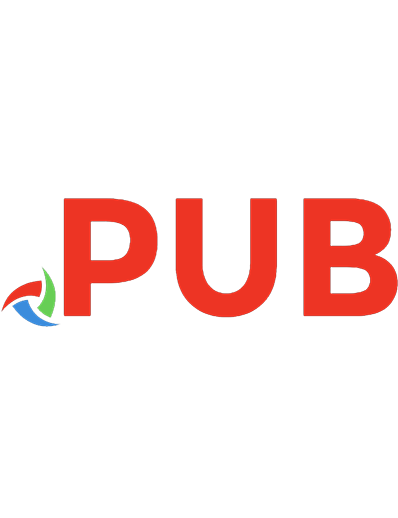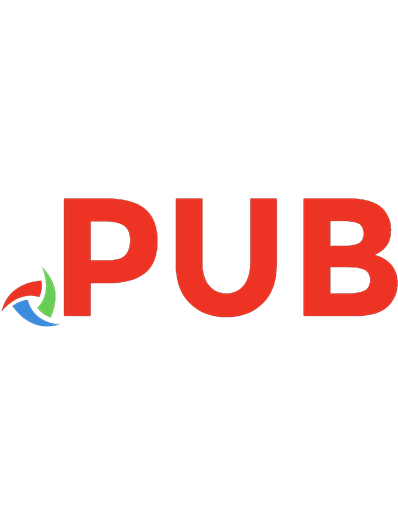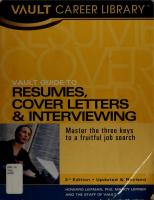Stand Out Cover Letters: The Workbook
618 124 2MB
English Pages [30] Year 2016
Polecaj historie
Citation preview
1
Copyright © Mark Baker 2016 All rights reserved. No part of this publication may be reproduced, distributed or transmitted in any form or by any means, including photocopying, recording, or other electronic or mechanical methods, without the prior written permission of the copyright owner or publisher, except in the case of if you are the verified purchaser of the book, Stand Out Cover Letters: How to Write Winning Cover Letters That get you Hired in which case you are permitted to print this workbook in order to work through the exercises discussed in the book. The information provided within this book is for general informational purposes only. While the author tries to keep the information up to date and correct, there are no representations or warranties, express or implied, about the completeness, accuracy, reliability, suitability or availability with respect to the information, products, services, or related graphics contained in this book or associated workbook for any purpose. Any use of this information is at your own risk. Disclaimers Some of the links in this book may be affiliate links. If you click them and decide to buy something, I may get paid a commission. This won’t cost you any extra. I only include links to products or services that are either my own or that I use or that I use or would happily use myself.
2
Contents
How to Use this Workbook........................................................................................................ 4 1.
Define Your Value (Refer: Chapter 3) ............................................................................... 5
2.
Is it the right job? (Refer: Chapter 5) ............................................................................... 18
3.
Write Your Letter (Refer: Chapter 6 - 10) ........................................................................ 27
3
How to Use this Workbook This workbook has been designed to be used in with my book, ‘Stand Out Cover Letters: How to Write Winning Cover Letters That Get You Hired’. This workbook refers back to chapters in the main book which are required to be read to fully understand the principles and concept behind writing stand out cover letters. If for some reason you are reading this without having purchased the book please go to amazon.com where you will be able to purchase a copy. Please note websites are continually updating and changing the look of their site interfaces. If the images in this workbook which refer to other sites look different to those you may be seeing, it is simply a matter of navigating around on their site to find what you are looking for. Simply print the workbook and use it as you work through the main book.
4
1. Define Your Value (Refer: Chapter 3)
Getting feedback from others
Go to www.surveymonkey.com
You only need a free account
Once you’ve signed up and log on click on the Create Survey button
5
Choose ‘Build a New Survey from Scratch’. Give your survey a name and select a category. The one I use is “get customer feedback”.
Now you’re going to design your survey which basically means coming up your questions. Here are some examples.
Question 1 – Thinking about me in a work context write down 3-5 strengths you think I have Use the multiple text box option and label each line with a number form 1-5 as below:
Now repeat the exact same process for two more questions: Question 2 - What 3-5 personal qualities do I have that would make me an asset to an employer? Question 3 - What 3-5 areas would you say I could work at improving?
Click Save my survey
6
Now click
You’ll want to check that everything is as you want it to be. Make sure you check for spelling errors too.
Once you are sure it’s good to go click on in your account as in the example below.
Hover your mouse over the people icon this and you’ll see the following page
and you’ll see your survey listed
and you’ll see “Collect Responses”, click on
7
You can send the survey via email directly from within Survey Monkey. You’ll need the email addresses and also the text to put in the body of the email which you can find in the main book in the chapter called, “Define Your Value”. Alternatively you can click on Get Web link which is a unique URL you can share with others in if you decide to rather opt to send the email directly from your own email account. Make sure you change the settings so that your responses are anonymous for whichever way you decide to collect data. This helps people to feel it is safe to give you honest feedback.
Now you simply have to wait for people to respond. You’ll be able to come back and click on the Response summary which will give you information about your survey responses. Once you’ve had all your responses back record the information below so that you have it all in one place for your information.
Question 1 What do people say are your strengths in the work place?
8
Question 2 What 3-5 personal qualities do I have that would make me an asset to an employer?
9
Question 3 What 3-5 areas would you say I could work at improving?
10
Brainstorm In this chapter I explain how brainstorming is a useful technique to get information out of your head and on to paper. Here’s what a typical brainstorm might look like on the subject of growing up.
(Photo courtesy of: https://au.pinterest.com/maryscaletta/productivity-mind-mapping/)
11
Here’s a space for your own brainstorm as per the book’s instructions. Have fun…
12
Mind map With your brainstorm completed you’re ready to move on to organizing that content into a mind map. There are many ways to mind map so here are a two examples on different topics. Note how the element of organization features in each. All you’re doing is organising the information from your brainstorm according to a structure of headings which you decide on. Mind maps can be as detailed or simple as you choose hand written or software generated. Here is a simple line one.
(Photo courtesy of: https://antontarasenko.com)
Often mind maps include color and even drawings to bring them to life. Here are two more examples:
13
(Photo courtesy of: http://blogs.isb.bj.edu.cn/16meganf/tag/mind-map)
14
Time for your own mind map now! Here’s a space. Be as creative as you like…
15
More Categories See if you can add any of these categories and come up with additional points to add. 1. I am … (Complete this sentence in as many ways as you can) E.g. ‘Organised’, ‘punctual’ 2. I want … (Complete this sentence in as many ways as you can) 3. I can … (Complete this sentence in as many ways as you can) 4. I know I’m good at… 5. I think I’m good at… 6. What’s important to me in my personal life? (personal values) Honesty, Love etc. 7. What’s important to me at work / in a job? (work values) Professional development etc. 8. Qualifications 9. Education 10. Interests / Hobbies 11. What am I experienced at doing? 12. Skills 13. What can I do that others can’t, don’t or won’t do? 14. What am I doing when I’m most engaged / stimulated? 15. What have I done that’s made a difference to others? 16. What are my achievements? 17. What are my priority goals? 18. Words that describe my personality are …
16
19. What do others say I’m good at? 20. My ideal Manager is… 21. My ideal work environment is… 22. If I didn’t have to work for money what would I do with my life? 23. My job expectations are… 24. The kind of people I like working with are … 25. What do I want people to say about me after I leave a job? 26. My strengths are … 27. How do I like success to be measured?
Have you completed the “So what?” test? If you’re not sure what this is go back to the book and read what you need to do to make sure that you have qualified all the points about yourself as much as possible.
17
2. Is it the right job? (Refer: Chapter 5) It’s time to work through some questions in order to see if the job you’re considering is the right one for you. A word about the questions that follow: There are a lot of them. Answering all sixty every time you apply for a job will be extremely arduous and also unnecessary. I suggest you answer as many as you need to in order to get a good idea of how suitable the job is for you. Some will not pertain to the job you’re reviewing. In this case leave them out. Also not all of them require a written response. Only write responses to those that could be helpful when you come to creating your letter and resume.
1. What are the main tasks required to be done?
2. What problems / needs does this role fulfil in their organization?
3. What problems / needs will result if they don’t have someone in this role?
4. What problems / needs will result if they have someone in this role who is not the right person or who doesn't do the job as required?
5. How does this job fit into what I have been doing most recently for work?
18
6. What future career options could be available to me later on if I was to take this job?
7. Where is this job located? Is it feasible for me to make this commute twice a day every day?
8. What hours is the job likely to demand?
9. What salary and other conditions are offered?
10. Is over time involved? How much time? Is it paid above the job’s salary?
11. Is travel involved? How much?
12. What kind of work environment is involved? (E.g. office, factory, outdoors, construction site)
19
13. Are there any unusual conditions under which I will have to perform? (Weather, isolation, security etc.)
14. What if any special qualifications are required?
15. Is any special training required? Do I have this? If not do they offer to pay for it or must I do this before or after starting the job?
16. Is a particular talent required? Do I have this? Can it be learned?
17. What skills are required? (Social / interpersonal, mathematical, spatial, artistic, manual, dexterity, communication, technological etc.)
18. Is the job dangerous? In what way?
19. What are the health risks?
20
20. Is there a high learning expectation over the course of this job, with constant change involved? If so would I like this or would it be too stressful? Be realistic, you must know your limits.
21. Is this a routine job, with very little change involved? Would I like this or would it be boring?
22. What kind of interaction with the public is expected? High or low public contact?
23. What do people love about this job? What do they dislike about it?
24. Is physical appearance an important element in determining employment in this type of work?
25. What physical requirements define who is accepted into this line of work? (Vision, height, weight restrictions, flexibility are common requirements.)
21
26. What part does honesty, integrity, or a code of ethics play in the performance of this work?
27. Will I need to be part of an organization, a particular religion, a certain political persuasion, to be considered for this job?
28. How important is natural charisma and persuasive ability in doing well in this job?
29. Do I have any disabilities? How can I make this work for me rather than against me?
30. What are my most important or strongest needs right now?
31. What questions, unique to my life and situation, do I need to have answered? Write them down.
32. Do I feel that this work is worthwhile for me?
22
33. Will this work affect my home life? Put stress on my family? Strain my relationship?
34. Will I have time for my own personal leisure activities, interests and hobbies?
35. Can I see myself doing this work and being happy at it? Why / Why not?
36. What kind of a contribution will I be making to my community through this work? Is this important to me? Why?
37. Will this job require me to make major changes to my lifestyle? What are they? Am I comfortable with this?
38. Does this work fit my personality type? What is my personality type?
39. Will my central motivations keep me interested in this kind of work?
23
40. Can I use my preferred intelligences in this job?
41. Does this job satisfy my work preferences? (Realistic, Investigative, Artistic, Social, Enterprising or Conventional etc.)
42. How do I find out more about this job?
43. If I was this employer what would my ideal candidate be?
44. What problems would I be solving in this job?
45. What would the worst kind of person be for this employer to take on?
46. What would the company’s expectations of me be?
24
47. Why have they advertised this job?
48. Is there anything about this job that concerns me?
49. What would be the best part of this job?
50. What would the worst part be of this job?
51. What direct experience do I have for this job?
52. What indirect (transferrable) experience / skills do I have for this job?
53. What does this employer / company value?
54. Make a list of everything they are looking for (qualities, experience, values etc.)
25
55. What achievements would they value?
56. Does this job fit in with my current and future career goals?
57. Would I love doing this job every day? Why / Why not?
58. If money wasn’t an issue would I do this job for no pay?
59. Am I still interested in this job?
60. What is the name of the person to whom I must address my letter?
26
3. Write Your Letter (Refer: Chapter 6 - 10) The following template can be used to practise writing your letter following the steps or to make notes about what you could include in your letter. Refer back to the book for detailed instructions.
Step 1 - State the problem
Step 2 - Present the solution
Step 3 - Establish your Credibility
27
Step 4 - Demonstrate the Benefits of employing you
Step 5 - Prove that you’re an above average achiever
Step 6 - Make them a promise
28
Step 7 - Warn them you’re on the market
Step 8 - Call to action
Thought of writing a book yourself? You can. See the next page for how I did it: 29
NOW IT’S YOUR TURN Discover the EXACT 3-step blueprint you need to become a bestselling author in 3 months. Self-Publishing School helped me, and now I want them to help you with this FREE VIDEO SERIES! Even if you’re busy, bad at writing, or don’t know where to start, you CAN write a bestseller and build your best life. With tools and experience across a variety niches and professions, Self-Publishing School is the only resource you need to take your book to the finish line! DON’T WAIT Watch this FREE VIDEO SERIES now, and
Say “YES” to becoming a bestseller:
[WATCH THE FIRST VIDEO HERE]
30


![Gallery of Best Cover Letters: a collection of quality cover letters by professional resume writers [4 ed.]
9781593579173, 1593579179](https://dokumen.pub/img/200x200/gallery-of-best-cover-letters-a-collection-of-quality-cover-letters-by-professional-resume-writers-4nbsped-9781593579173-1593579179.jpg)



![Make Paper Products Stand Out [1 ed.]
9781595103062](https://dokumen.pub/img/200x200/make-paper-products-stand-out-1nbsped-9781595103062.jpg)



